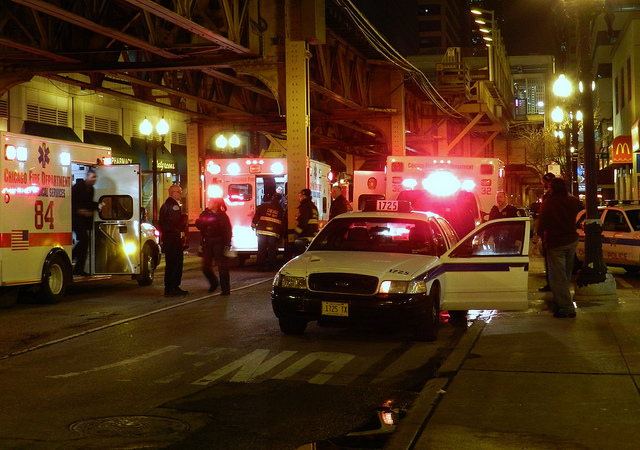Chicagoist's Top Stories Of 2014: CPD's Tinkering With Crime Statistics
By Chuck Sudo in News on Dec 30, 2014 7:20PM
On Monday Chicago Police Superintendent Garry McCarthy announced the city recorded 390 murders through Dec. 20. That's a decline over 2013's homicide totals (406) and 2012 (488) through the same period.
Considering Chicago had an eye-popping 512 recorded homicides two years ago, one would think McCarthy and Chicago Police Department would use those totals and the current ones to show that his department's strategies are working to deterring crime. Instead, the press releases from the Police Department have consistently touted 2014's homicide totals as "the fewest murders to date of any year since 1965." Like all facets of the Emanuel administration, CPD knows how to stay on message.
And local media has parroted this party line all year. Never mind Chicago's population density was greater 50 years ago and the Police Department is facing threats that would have been unheard of a half-century prior. It's how you control the conversation and if you have to dig deep back into the city's history to put the murder totals into context then, hey, why not?
McCarthy, who came to Chicago from New Jersey with a highly lauded pedigree and a reputation as an acolyte of the CompSTAT crime-fighting methodology, has been under pressure from residents and his bosses to produce results. If that means comparing this year's murder totals to a point in the past, they'll do it. If that also means reclassifying some crimes as lower level investigations, as a Chicago magazine investigation earlier this year revealed, they'll do that, as well. One police lieutenant called it "the washing machine" because "they wash and rinse the numbers."
Another thing to consider is shootings are up this year, even as the homicide totals have dropped. Through the end of November shooting incidents were up 10 percent over the same time frame last year, and shooting victims increased by 13 percent. McCarthy acknowledged this Monday and said gang culture remains a major riddle for police to solve and likely the reason for the increase in shootings.
But the homicide statistics are the glamor numbers here, the statistic that plays well on television newscasts and resonates the most with viewers who fear Chicago is a war zone. And that's the number Mayor Rahm Emanuel will use as a campaign bullet point when Bob Fioretti and Chuy Garcia attack the mayor on his 2011 campaign promise to hire 1,000 more police officers. Emanuel has defended himself by reminding voters he and McCarthy transferred scores of police officers from desk jobs to the streets. But McCarthy's crime-fighting strategy also relies heavy on police overtime costs that loom as possible budget busters, has credit rating agencies waiting to downgrade Chicago's bond rating even lower and taxes the resources and physical and emotional well-being of an already understaffed police department.
And don't tell the folks in depressed communities on the South and West sides the crime stats are trending downward. Then as now, they're the ones most affected by violent crimes. They're the ones hearing what McCarthy is saying and are confused by the disconnect as another child, sibling, relative or spouse is killed. They're the ones who rail angrily at Emanuel when he suggests in the middle of their grieving they should read more to their children and instill values in them. Maybe Emanuel can Build a New Chicago in those communities by investing in them, since the other factors they share besides high crime rates are unrelenting poverty brought on by decades of urban disinvestment. Initiatives such as summer jobs and after school programs, reading initiatives and camps will only go so far if the communities don't receive fundamental infrastructure investments. As Bill Savage wrote in an op-ed for Crain's Chicago Business earlier this year, "It makes no difference that a crime has its roots in 'another neighborhood,' and to suggest otherwise is to embrace an attitude that thwarts progress against violent crime."
